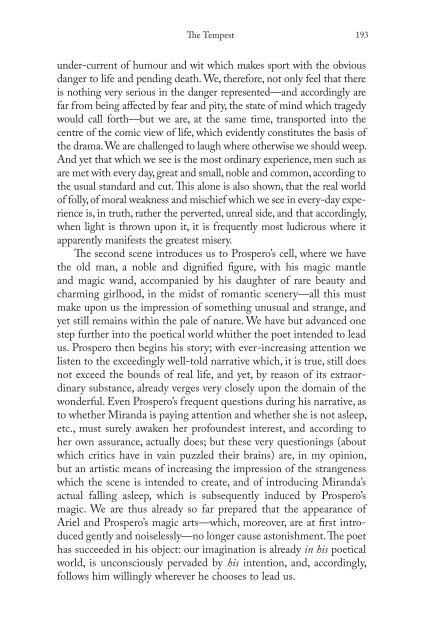Blooms Literary Themes - THE TRICKSTER.pdf - ymerleksi - home
Blooms Literary Themes - THE TRICKSTER.pdf - ymerleksi - home
Blooms Literary Themes - THE TRICKSTER.pdf - ymerleksi - home
Create successful ePaper yourself
Turn your PDF publications into a flip-book with our unique Google optimized e-Paper software.
Th e Tempest 193<br />
under-current of humour and wit which makes sport with the obvious<br />
danger to life and pending death. We, therefore, not only feel that there<br />
is nothing very serious in the danger represented—and accordingly are<br />
far from being aff ected by fear and pity, the state of mind which tragedy<br />
would call forth—but we are, at the same time, transported into the<br />
centre of the comic view of life, which evidently constitutes the basis of<br />
the drama. We are challenged to laugh where otherwise we should weep.<br />
And yet that which we see is the most ordinary experience, men such as<br />
are met with every day, great and small, noble and common, according to<br />
the usual standard and cut. Th is alone is also shown, that the real world<br />
of folly, of moral weakness and mischief which we see in every-day experience<br />
is, in truth, rather the perverted, unreal side, and that accordingly,<br />
when light is thrown upon it, it is frequently most ludicrous where it<br />
apparently manifests the greatest misery.<br />
Th e second scene introduces us to Prospero’s cell, where we have<br />
the old man, a noble and dignifi ed fi gure, with his magic mantle<br />
and magic wand, accompanied by his daughter of rare beauty and<br />
charming girlhood, in the midst of romantic scenery—all this must<br />
make upon us the impression of something unusual and strange, and<br />
yet still remains within the pale of nature. We have but advanced one<br />
step further into the poetical world whither the poet intended to lead<br />
us. Prospero then begins his story; with ever-increasing attention we<br />
listen to the exceedingly well-told narrative which, it is true, still does<br />
not exceed the bounds of real life, and yet, by reason of its extraordinary<br />
substance, already verges very closely upon the domain of the<br />
wonderful. Even Prospero’s frequent questions during his narrative, as<br />
to whether Miranda is paying attention and whether she is not asleep,<br />
etc., must surely awaken her profoundest interest, and according to<br />
her own assurance, actually does; but these very questionings (about<br />
which critics have in vain puzzled their brains) are, in my opinion,<br />
but an artistic means of increasing the impression of the strangeness<br />
which the scene is intended to create, and of introducing Miranda’s<br />
actual falling asleep, which is subsequently induced by Prospero’s<br />
magic. We are thus already so far prepared that the appearance of<br />
Ariel and Prospero’s magic arts—which, moreover, are at fi rst introduced<br />
gently and noiselessly—no longer cause astonishment. Th e poet<br />
has succeeded in his object: our imagination is already in his poetical<br />
world, is unconsciously pervaded by his intention, and, accordingly,<br />
follows him willingly wherever he chooses to lead us.

















